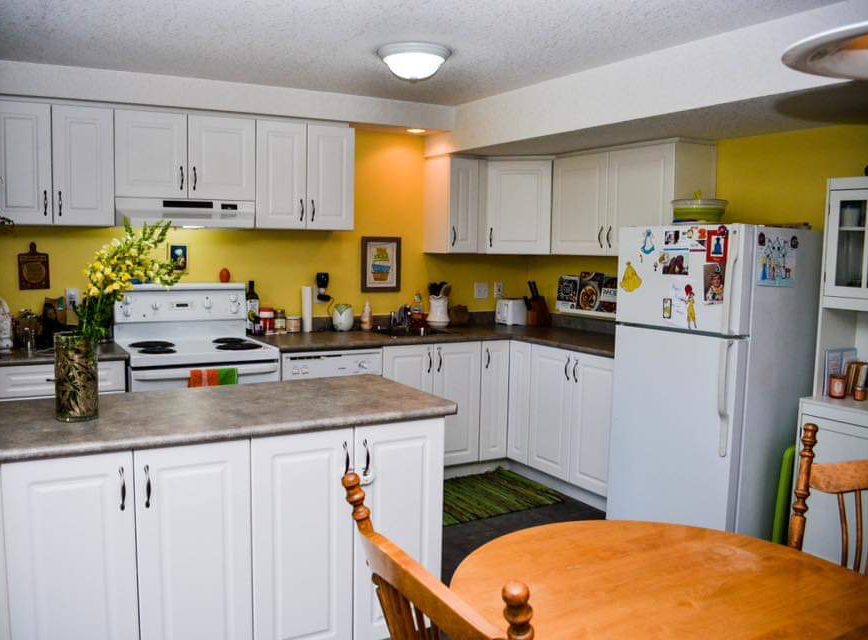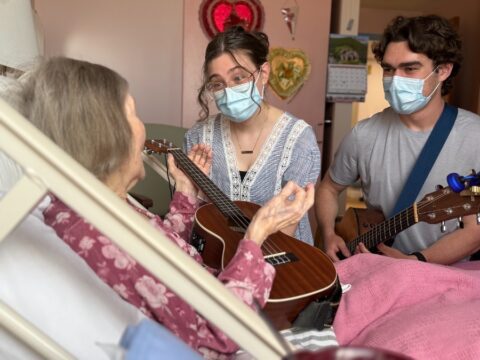Mandi Em says she rented basement apartments just outside of Vancouver for many years — but one made her feel as if she were in a “prison.”
The door to the suite was inside a crowded garage, and the family would have to squeeze past tons of stuff, which sometimes included multiple boats, to enter the unit. Once inside, the apartment felt small and cramped, and had tiny pocket windows typical of underground apartments. One of the bedroom windows even looked into the garage, says the freelance writer, who goes by Mandi Em professionally.
“When you’re in a basement suite, you have limited control over your surroundings,” says Em, who last lived in that specific apartment with her husband and three young children, lodging that they found unsuitable but one of the only affordable housing options in the area.
“We sacrificed our mental health for four years so that we could save up enough money, and then we moved five hours away,” says Em, who left the Vancouver area in 2018 and now lives in Vernon, B.C. “That’s an excessive solution, but it was the only one we had available… I didn’t think I was going to make it. There were points where I was suicidal.”
In Canada’s current housing crunch, basement apartments have become affordable housing options for many people. However, renting one may come at the cost of tenants’ mental well-being, and can cause other problems.
Em says that she and her husband experienced mental-health struggles while they lived below ground, and had trouble sleeping due to excessive noise. They were also constantly sick, which they attributed to the mould growing in their windows.
Liz Sinclair Kruth, a registered psychotherapist in Guelph, Ont., says that living in a basement apartment can potentially exacerbate, or even cause mental health challenges.
“There is often less natural light in basement dwellings, which can lead to feeling depressed,” says Sinclair Kruth. “A lack of natural light can also lead to difficulty sleeping and disrupted sleep-wake cycles, which can lead to feeling fatigued but not able to rest properly. There are other potential health concerns of living in basement dwellings that also need to be considered — risks of mould, radon, and increased risk of death or injury in the case of fire.”
Sinclair Kruth suggests that basement dwellers get outside for at least 30 minutes a day, buy plants to take advantage of available natural light and move furniture around to be near windows. And while research is limited, light therapy, such as a lamp to treat seasonal affective disorder, could prove beneficial.
It’s difficult to say how many people deal with mental health problems brought on or exacerbated by living in a basement. Toronto-based landlord and tenant lawyer Caryma Sa’d says that might be because of the high number of illegal rental units.
Many jurisdictions have guidelines for legal units. The Ontario government, for example, has minimum standards for creating a legal basement apartment, which can include municipal zoning requirements and building permits. Regulations also dictate the size of specific rooms, window size and ceiling height.
“Some thought has been put into what makes a place adequate for habitation,” says Sa’d.
“We sacrificed our mental health for four years so that we could save up enough money, and then we moved five hours away.”
That said, it’s still hard to know how many people benefit from these regulations, and even a well-made unit is no guarantee of a home conducive to healthy living. Like Em, I also lived in multiple basement apartments as a young mother with my husband and children. Our last apartment was in a beautiful, wealthy neighbourhood, but our neighbours weren’t friendly because we weren’t considered part of the community—we were just the basement dwellers.
I have always lived in units that were considered well constructed. One apartment had Berber carpet, a beautiful fireplace with a mantle and granite countertops in the kitchen. But these high-end finishes didn’t make up for the lack of sunlight and loneliness that eventually crept in. My family dealt with mould, constant sickness, depression, and feeling disconnected from our community. Both Em and I agreed that staying at home with our children while living in a basement likely intensified our low mood. Someone who works outside the home and gets frequent exposure to sunlight, exercise and social interaction might have a different experience.
Urban planner Shannon Holness says housing policy as a whole lacked momentum when she first started researching it for her masters degree in 2015. One of those neglected areas of housing policy was basement apartment rentals.
Holness says that the more casual arrangement between a landlord and basement tenant can create precarious housing situations and leave renters vulnerable to situations like eviction, but also interpersonal conflict due to two different groups of people living in close proximity. Naturally, that elevated stress isn’t good for your mental health or sense of well-being.
“When you don’t have a choice, the choices that you have aren’t really choices either, they’re just options,” says Holness, who is also a passionate community activist and has lived experience in precarious housing.
The lack of data on basement suites makes it difficult to understand how many people live in them across the country, Holness says.
“It shows how unregulated that market is… I think it’s just another sign that our housing is in a crisis.”
Moving five hours away was worth it for Em. She says that getting into her own above-ground home immediately improved her quality of life and mental health.
“It was sad that my kids couldn’t look out the window… those are things you take for granted. When you don’t have them, you realize how amazing it is to see the sun.”















